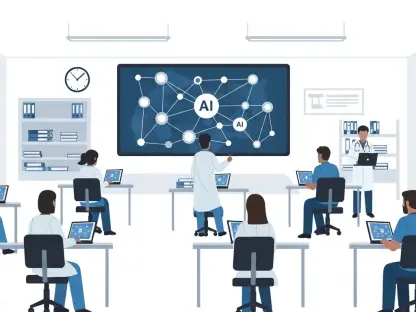Faisal Zain, a noted expert in medical technology, has been at the forefront of innovating medical devices that enhance diagnostic and therapeutic processes. In this interview, Faisal delves into the transformative role of AI in nursing, reflecting on how this technology is alleviating burdens and reshaping the work environment in healthcare settings. He sheds light on the ongoing challenges of nurse burnout, the national shortage, and optimistic perspectives on AI as a collaborative partner in care delivery.
Could you explain the revamped “self-care” provision in the 2025 American Nurses Association Code of Ethics?
The updated “self-care” provision in the 2025 Code of Ethics emphasizes the importance of well-being among nurses. Recognizing the mental and physical demands nurses face, it proposes strategies to combat burnout comprehensively. This shift towards encouraging personal health and mindfulness in practice aims to foster an environment where nurses can maintain sustainable career longevity, prioritizing both patients’ and their own well-being.
How does AI help in addressing nurse burnout and administrative burdens?
AI primarily addresses the high administrative load by automating repetitive and time-consuming tasks. This allows nurses to shift focus from paperwork to patient care. Moreover, AI assists in streamlining workflows and optimizing staff schedules, which can mitigate burnout by making work more manageable and lessening the kind of fatigue that often leads to career dissatisfaction.
What are the specific tasks where AI can augment clinical decision-making for nurses?
AI excels in tasks that require data analysis and trend prediction, such as evaluating patient health data or forecasting potential health risks. By processing vast amounts of information quickly, these tools assist nurses in identifying critical patient conditions and streamline decision-making processes, especially in high-pressure environments like emergency rooms.
Can you discuss the role of AI in triage care settings, especially in busy emergency rooms?
In triage settings, AI serves as a pivotal tool for assessing patient conditions. It can evaluate vital signs in real-time, predict intervention needs, and anticipate hospital stays, which significantly aids nurses in prioritizing care and managing patient flow more efficiently, especially during peak times.
How does AI-driven clinical decision support help reduce the cognitive load on nurses?
AI systems augment decision-making by providing evidence-based recommendations and analytics-driven insights, lessening the mental strain of evaluating complex or voluminous data. This not only ensures patient safety but also eases the cognitive pressures on nurses, enabling them to focus on direct patient interactions and care.
What does the national nurse shortage look like, according to HRSA estimates, through 2037?
Currently, we anticipate a 10% shortage that is likely to continue until 2037, though it may eventually decrease to 6%. Varying by region, these figures highlight the urgent need for innovative solutions like AI to ease workload challenges and improve recruitment and retention efforts.
How can AI tools help in easing the documentation burden on nurses?
AI tools streamline documentation by automating data entry through natural language processing. Nurses can verbalize notes, which are then transcribed and integrated directly into patient records, significantly reducing the time typically spent on documentation and allowing more interaction with patients.
Can you describe how natural language processing is used in AI tools for nursing?
Natural language processing allows for the transcription of spoken words into digital text. In nursing, this technology translates verbal notes into structured data, enhancing the accuracy and efficiency of documentation and freeing nurses from manual input tasks.
How do these AI tools auto-populate fields and reduce time spent on documentation?
By using algorithms to scan and interpret incoming patient data, these tools can automatically fill necessary fields, reducing redundant clicks and refinements. AI can also generate comprehensive summaries from extensive records, minimizing nurses’ time spent on documentation and data handling.
What are the challenges related to staffing and scheduling due to the nursing shortage?
The nursing shortage creates scheduling headaches, as nurse managers struggle to balance available workforce against necessary skills and certifications. This often results in overworked staff and potential coverage gaps, both detrimental to care standards and staff morale.
How do AI-driven smart scheduling platforms work to optimize scheduling for nurses?
These platforms utilize advanced algorithms that consider numerous factors, such as staff availability, specializations, and patient needs. By dynamically adjusting schedules, these tools optimize staff deployment, ensuring effective coverage and lowering the chances of burnout.
What trends can AI-driven scheduling platforms identify to prevent staff fatigue?
AI can detect patterns like frequent overtime, inadequate shift distribution, or inconsistency in workloads, which are signs of pending fatigue. By identifying these trends, these platforms can adapt scheduling forecasts, dispersing workload evenly and ensuring sustainable staff health.
Why is flexible scheduling so important for nurse retention and satisfaction?
Flexible scheduling directly impacts job satisfaction by accommodating personal and professional needs. When nurses can balance work commitments with personal life, they are less likely to experience burnout and more inclined to stay in their roles longer.
What are the potential risks and benefits of nurses partnering with AI as opposed to seeing it as a replacement?
While there is concern about AI replacing human roles, the key benefit lies in partnership. AI takes over routine tasks, which allows nurses to engage in patient-care activities requiring human insight and empathy. However, reliance without proper integration can upset the balance needed for effective care.
How does AI help nurses manage complex care needs in high-pressure environments?
AI tools analyze and present the most relevant patient data in real-time, empowering nurses to address complex situations more decisively. In doing so, nurses can anticipate and meet patient needs rapidly, even under stress.
What role do nurses play in developing AI tools to ensure they maintain patient safety and ethical standards?
Nurses bring invaluable practical insights to AI development. Their involvement helps refine tools for better clinical relevance and maintain ethical care standards, anchoring the technology in realistic healthcare needs and ethical considerations.
How does AI enable nurses to work at the top of their license, and why is this important?
AI liberates nurses from redundant tasks, allowing them to engage fully in responsibilities that require their clinical expertise and judgement. This not only enhances patient care but also ensures that nurses operate within their maximum skill set, elevating both personal job satisfaction and professional development.
Could you discuss the involvement of nurses in representing and advancing technology in healthcare settings?
Nurses are crucial advocates for technology that they integrate into practice. Actively participating in the design and implementation of these tools ensures they are not only efficient but also enhance care quality, aligning with patient and caregiver needs for maximal benefit.









